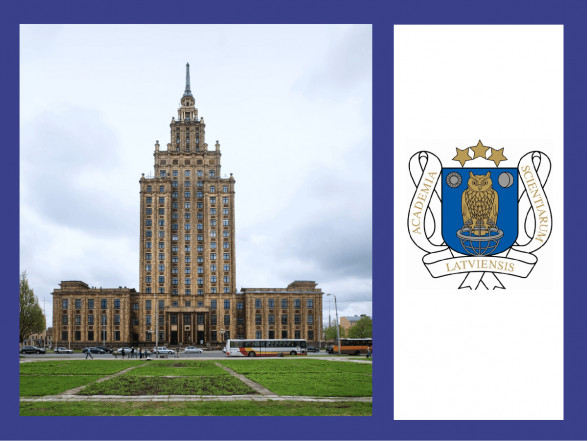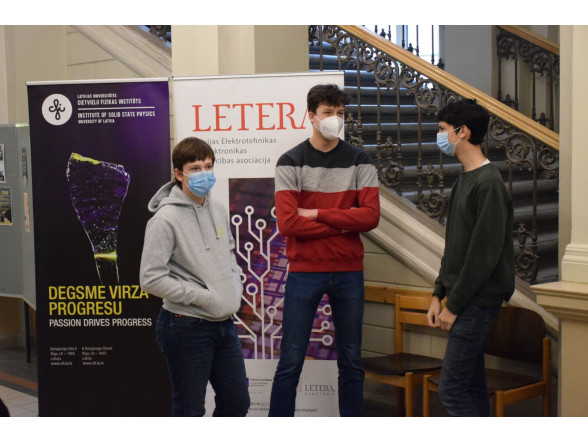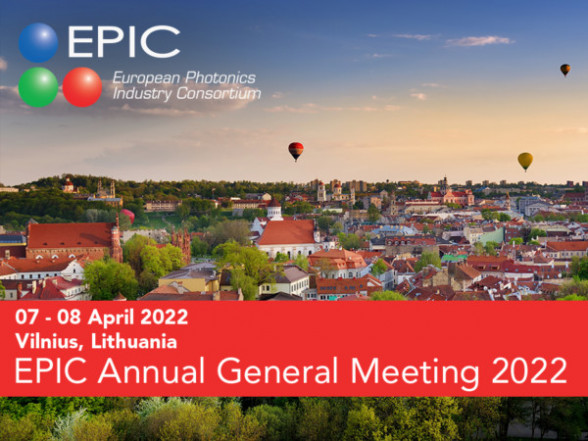The Latvian Academy of Sciences (LAS) has announced the winners of the annual Science Achievements Competition - the top twelve achievements were selected from 47 eligible proposals submitted for evaluation. In the category of Theoretical Science – Fundamental Research, the study titled “Tomorrow’s Energy: Unlocking the Potential of Graphene, Batteries, Superconductivity, and Photocatalysis” was recognized as one of the most significant achievements of the year in Latvian science. The authors include ISSP UL’s leading researchers Roberts Eglītis (Laboratory of Computer Modeling of Electronic Structure of Solids), Juris Purāns (Thin Films Laboratory), and Anatolijs Popovs (Laboratory of Kinetics in Self-Organizing Systems), and Dr. Ran Jia from Jilin University in China.
Between 2023 and 2024, the research group published 13 articles in prestigious scientific journals showcasing significant innovations and theoretical models in materials science and energy. Their work has significantly advanced our understanding of new materials and their potential applications in energy harvesting technologies. Notably, they developed theoretical models to predict which materials might be suitable for solar energy technologies, including borazole (BN) nanotubes formed through boron-boron (B-B) and nitrogen-nitrogen (N-N) bonds, as well as carbon nanotubes derived from Me-graphene.
The team also proposed new surface and interface structures of perovskite materials that could be utilized in catalytic processes for water splitting to produce oxygen and hydrogen—a crucial advancement in hydrogen energy development. They discovered that imino groups in the allotropic structure of carbon can regulate the material’s band gap, making graphdiyne a highly promising photocatalyst for both water splitting and carbon dioxide (CO₂) reduction.
Additionally, they developed a new cobalt-phosphorus-coated molybdenum disulfide (2D-MoS₂)-based photocatalyst (Co-P@MoS₂), which demonstrates high efficiency in photocatalytic reactions, thus opening new avenues in energy conversion technologies.
Moreover, the researchers introduced a novel method for precisely determining the superconducting transition temperature under non-equilibrium conditions, further enhancing our fundamental understanding of superconductors.
In the category of Applied Science, one of the winners was research in biotechnology and medical processes titled “Innovative microfluidic technology for personalized pancreatic cancer treatment.” The co-author of this work is the leading researcher of the ISSP UL’s Micro and Nanodevices Laboratory, PhD Roberts Rimša. Other co-authors are: Mg. Karīna Goluba, PhD Vadims Parfejevs, PhD Evita Rostoka, Mg. Kaspars Jēkabsons, Mg. Ilze Blāķe, Mg. Anastasija Neimane, Annija Anete Ule, Mg. Reinis Vangravs, Dr. Andrejs Pčolkins, and LAS full member Una Riekstiņa all representing the University of Latvia.
Pancreatic adenocarcinoma is one of the most challenging forms of cancer, with about 90% of patients unfortunately passing away within five years of diagnosis. This high mortality rate is largely due to the cancer’s resistance to standard treatments, highlighting the urgent need for personalized treatment strategies.
In response to this need, the team of researchers, as part of the National Research Programme (VPP) Photonics, Smart Materials, Technologies, and Engineering project, has created an innovative microfluidic device. This device mimics the intricate interactions between tumors and blood vessels, allowing to accurately model how drugs affect the tumor environment. With this technology, we can assess how easily substances can pass through blood vessels, identify important biomarkers, study cancer (metastasis) spread, and evaluate how individual patient tumor cells respond to different therapies.
Microfluidic organ-on-chip technology shows great potential in improving treatment effectiveness and making significant strides in the battle against pancreatic cancer.
2024 marks the 23rd anniversary since the Latvian Academy of Sciences launched the annual science achievement competition. The principal aim of the competition since then has been yearly monitoring of the processes in Latvian science by assessing and naming the most significant achievements of the year. Also, the results and winners of the competition would be popularized among the wider public, thus contributing to science communication in Latvia. Since 2011, as the competition gained popularity among researchers and the academic community, the winners are awarded diplomas, and a special awarding ceremony is held. In the following years, the event’s regular and numerous attendees include its supporters, sponsors, media representatives, and other stakeholders. This annual event highlights and celebrates the excellence in Latvian science and research.
Read more about the LAS Achievement of the Year Award



